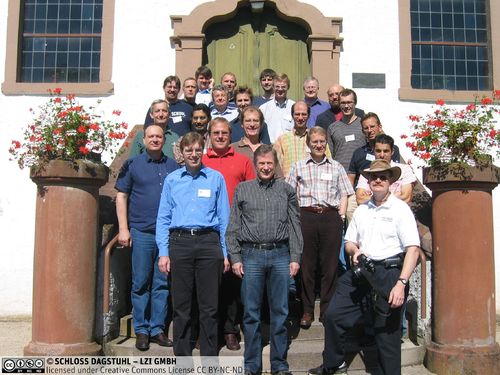Dagstuhl Seminar 07301
Resilient and Survivable Networks, Infrastructure and Services
( Jul 22 – Jul 25, 2007 )
Permalink
Organizers
- Hermann de Meer (Universität Passau, DE)
- David Hutchison (Lancaster University, GB)
- Bernhard Plattner (ETH Zürich, CH)
- James P. G. Sterbenz (University of Kansas - Lawrence, US)
Contact
As we become increasingly reliant on networked applications in the consumer, commercial, government, and military sectors, it is essential that they are resilient and survivable to a number of challenges, including:
- unusual but legitimate traffic load (e.g. flash crowds)
- high-mobility of nodes and sub-networks
- weak and episodic connectivity of wireless channels
- unpredictably long delay paths either due to length (e.g. satellite) or as a result of episodic connectivity
- attacks against the network hardware, software, or protocol infrastructure
- large-scale natural disasters
- failures due to mal-configuration or operational errors
- natural faults of network components
The challenge is to provide acceptable service to applications, in particular the ability for users and applications to access information and for the maintenance of critical end-to-end communication associations. Furthermore, resilient network services must remain accessible whenever possible, ensure correctness of operation when performance is degraded, and automatically recover. Finally, resilient and survivable networks need to be engineered to have emergent behaviour so that they can resist challenges to their operation, recognize when challenges occur and autonomically limit their effects, recover rapidly to normal operation, and refine future behaviour. We propose to exploit techniques in programmable, active, and cognitive networking to achieve these goals.
Only a few aspects of these challenges have been explored by the research community. Fault tolerance is a mature discipline from which we can learn, but considers only a very small subset of the problem. Recent work on DDOS attacks and early work in disruption-tolerant networking are also a piece of this puzzle. We aim to consider all aspects of the provision so application, service, and network resilience and survivability. We view resilience and survivability as an emerging hot topic that is in need of a systematic framework to guide future research.
The goal of this seminar is to bring together researchers and engineers who have explored parts of this space, and who can contribute to the overall goals of helping to create a research agenda in resilience and survivability. Common research challenges should be identified and potential solutions discussed. Typical conferences and workshops do not allow such an interdisciplinary approach because of their tendency to focus on a particular technologies or aspects of the overall framework. As an outcome of this seminar, gaps among different research communities will be bridged, and as result their research agendas may be better aligned.
Areas of interest include, but are not limited to the following:
- Mobile, wireless, and sensor networking in challenged environments
- Resilient backbone and access network architecture
- Cross-layer optimizations (knobs and dials in vertical control loops)
- Resource tradeoffs (processing, memory, bandwidth, energy, latency)
- Resilience as a QoS property and metrics for resilience
- Resilience and survivability as an extension of conventional security
- Lessons learned from past failures and disasters (e.g. Hurricane Katrina, 2005 SBB rail network outage, 2003 Northeast US power failure, 9/11, 1988 Chicago PSTN central office fire,)
- Managing complexity and feature interactions
- Contributions from fault tolerant distributed systems community
- Interaction between network resilience and other infrastructures (e.g. the power grid)
- Resilient service creation, composition, and deployment
- Resilient and survivable auto-configuration, self-organisation, and self-management
- Pavlos Antoniou (University of Cyprus, CY)
- Torsten Braun (Universität Bern, CH)
- Marcus Brunner (NEC Laboratories Europe - Heidelberg, DE) [dblp]
- Georg Carle (Universität Tübingen, DE) [dblp]
- Hermann de Meer (Universität Passau, DE) [dblp]
- Simon Dobson (University College Dublin, IE) [dblp]
- Jordi Domingo-Pascual (UPC - Barcelona, ES) [dblp]
- Alex Galis (University College London, GB) [dblp]
- Dirk Haage (Universität Tübingen, DE)
- David Hutchison (Lancaster University, GB) [dblp]
- Merkourios Karaliopoulos (ETH Zürich, CH) [dblp]
- Amund Kvalbein (Simula Research Laboratory - Lysaker, NO)
- Joseph Bryan Lyles (Telcordia Technologies - Piscataway, US) [dblp]
- Deep Medhi (University of Missouri - Kansas City, US) [dblp]
- Bernhard Plattner (ETH Zürich, CH)
- Danny Raz (Technion - Haifa, IL) [dblp]
- Justin Rohrer (University of Kansas - Lawrence, US)
- Marcus Schöller (NEC Laboratories Europe - Heidelberg, DE) [dblp]
- Rolf Stadler (KTH - Stockholm, SE)
- James P. G. Sterbenz (University of Kansas - Lawrence, US) [dblp]
- Burkhard Stiller (Universität Zürich, CH) [dblp]
- Piet Van Mieghem (Delft University of Technology, NL) [dblp]
- Giorgio Ventre (University of Naples, IT) [dblp]
- Lars Wolf (TU Braunschweig, DE) [dblp]
Classification
- security / cryptography
- networks
- society
Keywords
- resilient survivable networks services
- critical infrastructure
- interdependence
- disruption tolerance
- fault tolerance
- mobile
- wireless
- self-organisation
- attack disaster resistance


